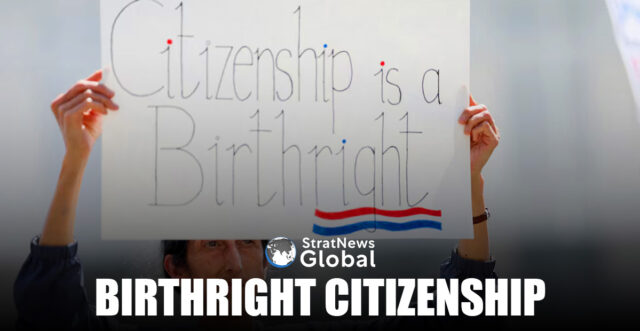The US Supreme Court on Thursday debated Donald Trump’s push to enforce his executive order limiting birthright citizenship, a move that could impact thousands of newborns annually and marks a significant challenge to longstanding constitutional interpretations.
The Supreme Court heard arguments on whether to limit lower courts’ power to issue nationwide injunctions, as used to block Trump’s executive order restricting birthright citizenship.
While the conservative majority appeared open to curbing such injunctions, no justice clearly backed Trump’s order. Liberal justices argued it likely violates the 14th Amendment.
Signed on January 20, Trump’s directive seeks to deny citizenship to U.S.-born children of non-citizen, non-resident parents.
Order Violates Multiple Supreme Court Precedents
Liberal Justice Sonia Sotomayor said she believes Trump’s order violates multiple Supreme Court precedents concerning citizenship.
Sotomayor said the court should weigh the order’s legality “if we are worried about those thousands of children who are going to be born without citizenship papers that could render them stateless” and leave them ineligible for government benefits.
‘Pathology’
If implemented, Trump’s order could deny citizenship to over 150,000 newborns each year, according to challengers including 22 Democratic state attorneys general and immigrant advocates.
The administration is asking the Supreme Court to limit judges’ ability to issue universal injunctions, without ruling on the order’s legality.
US Solicitor General D. John Sauer called such injunctions a judicial “pathology”. Conservative justices suggested that broader relief might instead be pursued through class-action lawsuits.
Complicated Issue
Complicating matters, some justices – conservatives and liberals alike – also seemed reticent to rule without further delving into the underlying legal merits of Trump’s directive. It remained uncertain whether the court would order further briefing, which would further delay resolution of the case.
Conservative Justice Samuel Alito asked Kelsi Corkran, a lawyer for some of the plaintiffs, “Should we decide or make up our minds on the underlying birthright citizenship question without briefing and argument and deliberation?”
Corkran said the justices should take up the case specifically on the merits of Trump’s order, adding, “The government is asking the court to allow it to ignore this court’s precedents … and to upend 100 years of executive branch practice.”
Plaintiffs argue Trump’s order violates the 14th Amendment, which has traditionally granted citizenship to nearly all born on US soil since its ratification in 1868.
The amendment states that anyone “born or naturalized in the United States” and “subject to the jurisdiction thereof” is a citizen.
The administration claims this does not apply to undocumented immigrants or those in the US temporarily, like students or workers on visas.
‘A Kinds Of Abuses’
Without a universal injunction blocking Trump’s order, it could be years before the Supreme Court finally decides its constitutionality, liberal Justice Elena Kagan said.
“There are all kinds of abuses of nationwide injunctions,” Kagan told Sauer. “But I think that the question that this case presents is that if one thinks that it’s quite clear that the (executive order) is illegal, how does one get to that result in what time frame, on your set of rules without the possibility of a nationwide injunction?”
Sauer noted that after the dispute percolates in lower courts, the Supreme Court can ultimately pronounce on the legal merits of the policy, prompting conservative Justice Amy Coney Barrett to express skepticism.
“Are you really going to answer Justice Kagan by saying there’s no way to do this expeditiously?” Barrett said.
Sotomayor compared Trump’s directive to a hypothetical action by a president taking away guns from every American who owns one despite the constitutional right to keep and bear arms.
Sauer said that since Trump returned to the presidency, federal judges have issued 40 universal injunctions against his administration’s policies.
“This is a bipartisan problem that has now spanned the last five presidential administrations,” Sauer said.
Variations By State
The administration wants to limit the injunctions against Trump’s order to only the 22 plaintiff states and individuals, potentially allowing the policy in the other 28 states.
States argue this would create costly confusion in administering benefits due to inconsistent citizenship rules.
Their lawyer, Jeremy Feigenbaum, said class-action suits aren’t an option for states and noted the Supreme Court resolved this legal issue over a century ago.
An 1898 Supreme Court ruling in a case called United States v. Wong Kim Ark long has been interpreted as guaranteeing that children born in the United States to non-citizen parents are entitled to American citizenship. The administration has argued that the court’s ruling in that case was narrower, applying only to children whose parents had a “permanent domicile and residence in the United States”.
The 14th Amendment overrode an infamous 1857 Supreme Court decision called Dred Scott v. Sandford that had denied citizenship to enslaved and free Black people and helped fuel the Civil War.
“This order reflects the original meaning of the 14th Amendment, which guaranteed citizenship to the children of former slaves, not illegal aliens or temporary visitors,” Sauer told the justices of Trump’s directive.
Conservative Justice Brett Kavanaugh asked Sauer what he called a “very practical” query about what happens the day after the directive would go into effect: “What do hospitals do with a newborn? What do states do with a newborn?”
This is the first Trump policy argued before the Supreme Court since his return to office, with three justices appointed by him during his first term. The Court has previously handled other Trump policy challenges on an emergency basis.
(With inputs from Reuters)





